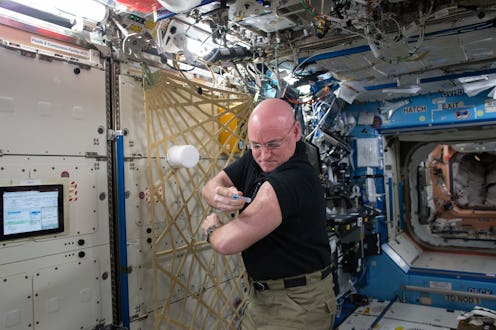News
This Is How Living In Space For 340 Days Impacts Your Body, In Case You Wondered

As it turns out, living in space can be taxing on your body— but that doesn't mean it's totally unsustainable. The NASA Twin Study results are finally in, three years after astronaut Scott Kelly, an identical twin, spent just under a year in space while his brother, Mark, stayed on Earth. The results of the study are wild: not only did Scott's body change drastically in a number of ways while he was in space, but it also returned to normal in most regards when he came back.
According to CNN, Scott spent 340 days in space from 2015 to 2016. During that time, both brothers had to give scientists blood samples so that researchers could track any changes to Scott's health (and yes, Scott did have to send in his samples from space). The results of this study were published on Thursday to Science magazine, as a product of the cumulative effort of 84 scientists from 12 universities in eight states, according to CNN.
The study reported that a number of aspects of Scott's overall health changed while he was in space, including reduced cognitive abilities, the thickening of his retina, and even gene expression changes, as well as a structural change to his telomeres (the caps at each end of a chromosome). But the wildest part of the study is what happened when Scott came back to Earth: Almost all of the side effects returned to normal.
The summary of the study reads in part, "Given that the majority of the biological and human health variables remained stable, or returned to baseline, after a 340-day space mission, these data suggest that human health can be mostly sustained over this duration of spaceflight."
One of the big conclusions from the study was that Scott's immune system reacted dramatically to his change in environment when he was in space, in the form of cellular stress. What's more, one of the ways in which his body has not returned to normal is related to this apparent stress. Christopher Mason, an associate professor of physiology and biophysics at Weill Cornell Medicine and one of the authors of the study, said, per The Cornell Chronicle:
While many of the changes reversed after Scott returned to Earth, a few remained, including cognitive deficits, DNA damage and some changes in T-cell activation. We don't know yet if these changes are good or bad. This could just be how the body responds, but the genes are perturbed, so we want to see why and track them to see for how long.
Of course, the study isn't all-encompassing, since it only contained two subjects. But still, experts believe it's a landmark moment of research for humans in outer space. To The New York Times, Dr. Eric Topol, director of the Scripps Research Translational Institute (who was not involved in the study), said, “I believe it’s the most comprehensive assessment of human beings to date. I don’t know that there’s been anything close to this.”
Mark and Scott told CNN about the landmark study, too. Mark suggested that he might go into space next time, if there was a next time in his lifetime, saying, "I'd even volunteer to be the person to get to go now that we know this about my brother, Scott."
Scott joked back in the interview, "I'm ready to go [again]. Put me on a two-year flight."